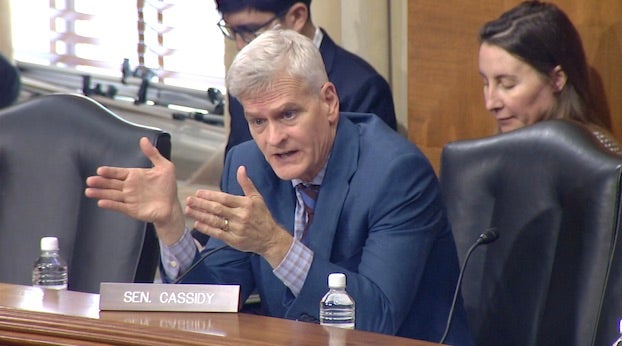Judge: More accountability needed for juvenile offenders in SW La.
Published 5:30 am Friday, June 21, 2024

- The Calcasieu Parish Police Jury, along with other parish and city officials, held the official ribbon-cutting ceremony and tour of the new Office of Juvenile Justice Services, 3615 E. Prien Lake Road in Lake Charles, on Friday. (Rita LeBleu / American Press)
Jennings City Court Judge Daniel E. Stretcher Sr. discussed plans Thursday to improve the local juvenile justice system by focusing on accountability.
Speaking to the Welsh Rotary Club, Stretcher said more accountability is needed for juvenile offenders and the system responsible for responding to juvenile court cases.
“We had an issue with what to do with juveniles, in particular what to do with them when they are a serious threat to the community, threat of harm and it’s been a very serious crime,” Stretcher said. “What do we do with them between the time the allegation happens and we get a report. We know what we do with adults who have allegedly committed criminal acts. An investigation is done, a probable cause is found, they are placed in pre-trial detention, bond is set and if they can make bond they are let out. We don’t have that for juveniles.”
Trending
Stretcher said stricter rules and regulations, cost of housing juveniles and lack of facilities have had an impact on how cases involving juveniles are handled.
“As a long-term solution, there has been an idea of setting up some regional juvenile districts to build facilities to hold pre-adjudication juveniles,” he said.
Last year, lawmakers created the Acadiana Regional Juvenile Justice District to build and operate a detention center to serve a nine-parish region including Allen and Jeff Davis. The facility would reduce the cost of housing juveniles out-of-state and keep them near their families.
As an alternative, officials are considering renovating a juvenile facility in Avoyelles Parish to house juveniles from the region.
“Yes, it would be great if we had something in place right now, but the fact is we don’t,” he said.
Most parishes are sending juveniles as far away as Alabama, which is costly, he said. For anything less than rape or a shooting, juveniles are usually sent home with a ticket and told to come back to court, he said.
Trending
“The bottom line is that the juvenile district and things we are planning to have are to help us in the future, but it’s going to take 2-3 years getting these built and things in place,” he said.
As a short-term solution, Stretcher has created new procedures for handling juveniles requiring police officers to provide additional information on the juvenile including where they live, if they are in school, who else they stay with, a list of contacts and if they are employed.
“I’m also requiring that within seven days the police department provide a preliminary report to the district attorney’s office and the judges offices of what is going on,” he said.
Under the old system, such information could take weeks or months to receive reports before a juvenile could appear in court.
The new system would require a juvenile to appear in court on the next court date once notice is given, he said.
“This puts everybody on notice that something is going on and it gets that juvenile in court immediately, so that they understand there is maybe a consequence or somebody is paying attention to what is going on,” Stretcher said.
Once in court, the judge can make sure who the juveniles are with, set curfews and other conditions upon release. He is also working to establish ankle monitors or other monitoring systems to keep track of the juvenile.
Juveniles will also be required to return to court on a more regular basis until all the paperwork and process is ready to go.
It also allows the district attorney’s office to do a pre-trial intervention program to provide juveniles with services including mental health and behavior evaluations.
“I think it holds the child more accountable and keeps the court more accountable,” he said. “I will know, the district attorney’s office will know and the police department will know when cases are coming up….So it’s a good system of check and balances to move these cases forward.”





